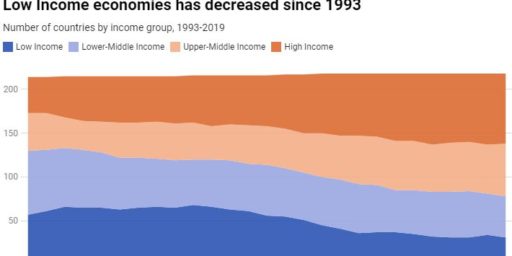Europe’s Middle Class Stagnant
The Middle Class is disappearing, the NYT reports. In Europe.
The European dream is under assault, as the wave of inflation sweeping the globe mixes with this continent’s long-stagnant wages. Families that once enjoyed Europe’s vaunted quality of life are pinching pennies to buy necessities, and cutting back on extras like movies and vacations abroad.
Potentially more disturbing — especially to the political and social order — are the millions across the continent grappling with the realization that they may have lives worse, not better, than their parents.
I blame Bush.
A study by the German Institute for Economic Research in Berlin found that the broad middle of the German work force, defined as workers making from 70 to 150 percent of the median income, shrunk to 54 percent of the population last year, from 62 percent in 2000.
[…]
To be sure, Europe’s middle class is still larger than the number of people at risk of falling into poverty — and, by many measures, more protected than the American middle class. But policy makers worry that could change as the European economy starts to feel the drag of an American slowdown and high inflation.
[…]
Much of the declining purchasing power of European workers can be traced to those numbers, and to policy decisions and economic developments over the last decade when globalization began to reshape Europe and the world.
In Germany, Europe’s largest economy, the decline in purchasing power began in 2000, when employers started wresting wage concessions from unions, or simply shifting jobs to Eastern Europe and China. Inflation-adjusted incomes rose from 1 percent to 2 percent in the late 1990s, but more than one million Germans lost full-time jobs during and after a recession in 2000 and 2001. Subsequently, workweeks got longer without extra pay, and from 2004 through 2007, inflation outpaced income increases for the average family.
In France, the 35-hour workweek kept average annual pay increases below 1 percent for nearly a decade, said Robert Rochefort, the director general of Credoc, an organization in Paris that researches living standards. But French hypermarkets — big-box supermarkets that dominate the retail market — kept prices high, he said.
Spain generated thousands of jobs by pumping up the housing market, but has undergone a joblessness jump since the turmoil in real estate markets while wages have been consumed by inflation.
In recent years, the American Left has pointed to similar trends in the United States and blamed deregulation, a flattened tax code, and other public policy decisions which have had the effect of letting the very successful keep more of their money while leaving those lower on the economic scale unprotected and having to compete with Third World labor. That essentially the same thing is happening in Europe, where even the most conservative governments are well to the left of any mainstream American Democrat and socialization of the economy is much more pervasive, would seem an indication that public policy is not the primary factor.






Over the period of the last 30 years there have been a number of policy decisions and technological developments that have worked synergistically to provide an advantage to the ownership of assets over labor. Capital has become much more efficient. It’s a worldwide phenomenon—not limited to the United States, to the U. S. and Europe, or even to OECD nations.
There’s no way to roll back the technology and trying to do so would be damaging but I think that changing the policies a little would probably be prudent. The concern, of course, is that policies would be changed too much and be too economically disruptive.
One of the policies involved is immigration policy. You can’t expect to import large numbers of uneducated peasants and expect your social structure to remain stable.
However, I’m not quite as desperate about the situation as many seem to be. Similar things were said about the Irish peasantry who came here in numbers 150 years ago and the Italian and Eastern European peasants who came a century ago. We adapted and our European cousins can, too. I think they’ll have a harder time because their societies are more inclined to define themselves ethnically.
On the bright side their lives will almost definitely be far more prosperous for far less work than that of their grandparents.
The policy trends are much the same in Europe as well, though the starting and ending points are different than in the US.
Perhaps Europe is simply embracing Rev. Wright’s philosophy and rejecting middleclassness.
“Instead, Ms. Salgado cut her fish purchases to once a week, switched to supermarket brands and away from health-food stores, and halved her visits to the psychotherapist. She spends some weekends with her children, Violeta, 9, and Juan, 4, at her ex-husband’s parents’ home in the countryside — a stressful arrangement, but one that enables her to avoid expensive weekends in Madrid.”
Wow, having to vacation in the countryside while cutting in half the number of visits to the psychotherapist! These poor folk would cling to guns and religion had they not voted away the right to own the former, and evolved past the ability to understand the latter.
I think it proves that
leftist, excuse me, progressive government policies can be seen to destroy the wealth of the working classes…But what do I know? I’m just a Conservative…